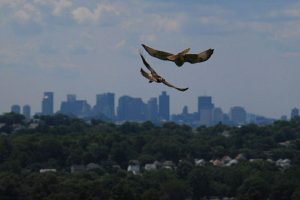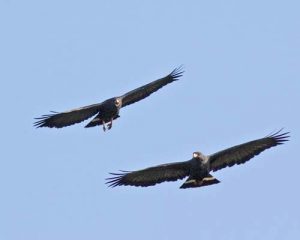Arriving at the creek at the edge of town at the zenith of the day, I’m surprised by the warmth, clarity, and quietness of the afternoon. As I drop down off the paved bike path, a large woodland hawk alights a small tree across the creek, and then departs as I approach.
Warm enough to sit under the sycamore in shirtsleeves, it’s an extraordinarily clear and bright winter’s day. For the first half hour, I don’t see any other hawks, or many birds of any kind for that matter.
But standing to stretch, I notice a lone kite hawk in the distance. I watch its characteristic flight pattern of fluttering in place as it scans the ground for prey. Seeing something worth pursuing, it falls–almost parachutes–to the ground in an ineffably graceful, gentle, and time stopping arc.
Returning to my seat, another kite hawk flies up from the opposite direction and lands directly overhead—the first time that’s happened in 15 years of taking sittings under this sycamore. And that’s just the beginning of the terrestrial play, featuring a cast of hawks.
A new type of hawk appears, one I’ve never seen before. It’s larger bodied and longer of wing, with fanning tail feathers. An  osprey! Another arrives and glides across the blueness with exquisite elegance and soaring splendor.
osprey! Another arrives and glides across the blueness with exquisite elegance and soaring splendor.
More hawks appear, woodland varieties, each species taking turns on the stage of the sky, seemingly drawn to the sycamore and the spot where a human being sits. Does nature respond to the human mind in meditation, because the universe as a whole is mind in meditation?
Perhaps confirming the insight, a group of small birds alight around one, darting within a foot and landing in the bushes behind and branches overhead. Then the masters of the air reappear to the west, the nonpareil osprey, where the sun is just reaching treetop level. The light on their wings intimates realms beyond description.
The ospreys fly near and cavort on the breeze, coming together and soaring apart, pirouetting, plummeting, and even at one  point locking together and plunging toward the ground in what looks for a few seconds like an out of control death spiral. But it’s all part of their play, and at the last moment they break apart and soar right over my head, as if to say, ‘Match that!’
point locking together and plunging toward the ground in what looks for a few seconds like an out of control death spiral. But it’s all part of their play, and at the last moment they break apart and soar right over my head, as if to say, ‘Match that!’
As if this weren’t enough, kites and other hawks materialize, all mocking Shakespeare’s line about materialistic man, who “struts and frets his hour upon the stage, and then his heard no more.”
The mind-as-thought is completely quiet, and one feels an admixture of quiet awe, deep gratitude, and intense blessing. Having negated, in passive watchfulness growing into blazing attention, the entire movement of thought-emotion, there’s no ‘me’ to take pleasure and pride in the event. Later, I feel almost like it happened to someone else.
As the sun sinks below the tree line, the warmth of a remarkable winter’s afternoon suddenly vanishes, as do the hawks. The wind suddenly comes up, and the day, with its immense beauty and mystery is over.
Martin LeFevre

